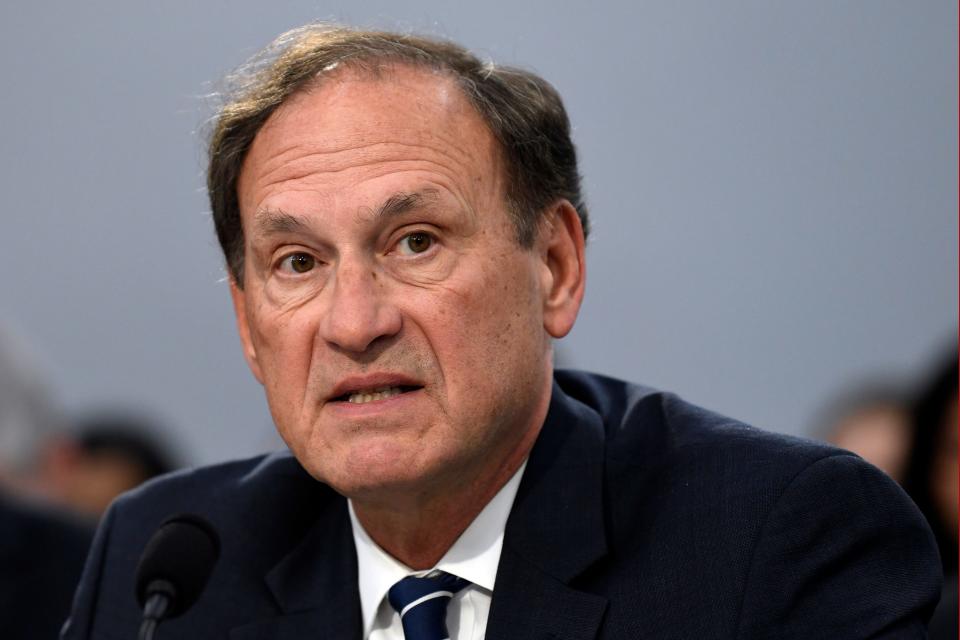Alito balks at Democratic calls to recuse in Supreme Court case involving Wall Street Journal op-ed
WASHINGTON ? Supreme Court Justice Samuel Alito on Friday declined to recuse himself from a tax case that involves an attorney who penned a laudatory opinion piece about him in the Wall Street Journal that praised the justice's "candor" and dismissed ethics concerns about the court.
In an unusual four-page statement, Alito dismissed a recusal request made last month by Senate Judiciary Committee Chairman Dick Durbin, D-Ill., and other Democrats as "unsound." Durbin said Alito should recuse from a pending tax case this coming term because one of the lawyers in that case, David Rivkin, wrote the opinion piece.
"There is no valid reason for my recusal in this case," Alito wrote Friday.
The dispute comes as the nation's highest court is reeling from a series of ethics problems, including luxury travel paid for by outside interests and previously undisclosed real estate transactions involving the justices. Alito was the focus of a ProPublica story in June involving a private jet flight to Alaska paid for by Paul Singer, a hedge fund billionaire, whose entities came before the court at least 10 times in recent years.
On Thursday, Justice Brett Kavanaugh signaled that the Supreme Court may take steps "soon" to address ethics scandals that have eroded confidence and sparked a partisan fight in Congress over whether lawmakers can force a code of ethics on the nation's highest court.

Alito did not recuse from the cases involving entities tied to Singer. He said at the time that even if he had been aware of Singer’s role in the cases before the court “recusal would not have been required or appropriate.” But, Alito said, he was not aware of Singer’s involvement because he personally was not a named party in the cases at issue.
Alito, a conservative, has repeatedly made his case on the pages of the Wall Street Journal opinion section, which is also conservative. He wrote an op-ed for the newspaper in June defending the Alaska trip before the ProPublica story published. About a month later, the newspaper published an opinion piece under Rivkin's byline with the headline: "Samuel Alito, the Supreme Court’s Plain-Spoken Defender." In that piece, Alito made clear his displeasure that attorneys outside the court were not defending the justices against what he viewed as "nonsense."
The Journal piece asserted that the justices had "come under attack" and claimed that "partisan journalists have tried to gin up 'ethics' scandals and incite animus against disfavored justices."
“I marvel at all the nonsense that has been written about me in the last year,” Alito told Rivkin, one of the authors on the Wall Street Journal piece that sparked the recusal debate. "The traditional idea about how judges and justices should behave is they should be mute,” and rely on others, including "the organized bar" to defend them, Alito said. "But that’s just not happening. And so at a certain point I’ve said to myself, nobody else is going to do this, so I have to defend myself.”
In his statement Friday, Alito noted other justices who sat for interviews with media and then declined to recuse in cases involving those companies. He pointed to an interview Chief Justice John Roberts gave with ABC News in 2006, for instance, and noted that Roberts did not recuse from a 2015 copyright case involving the company. He also pointed to interviews given by Justice Sonia Sotomayor and recently retired Justice Stephen Breyer to NPR, neither of whom recused from a defamation case against that outlet in 2019 that the court quickly denied.
Dig deeper: Brett Kavanaugh says he's hopeful the Supreme Court will take 'concrete steps' to address ethics scandals
The tax case at issue, Moore v. U.S., challenges a tax approved by Congress and President Donald Trump in 2017 on foreign earnings that are not distributed to U.S. investors but rather reinvested into the foreign company. Rivkin represents the plaintiffs challenging the tax ? a point the Wall Street Journal disclosed in the Alito piece.
"Senator Durbin’s request for my recusal is presumably based on the theory that my vote in Moore will be affected in some way by the content of the articles that resulted from the interviews, but that theory fundamentally misunderstands the circumstances under which Supreme Court Justices must work," Alito wrote. "We have no control over the attorneys whom parties select to represent them, and as a result, we are often presented with cases in which one of the attorneys has spoken favorably or unfavorably about our work or character."
Durbin criticized Alito for "sitting on a case involving a lawyer who honored him with a puff piece in the Wall Street Journal." The Supreme Court, Durbin said, "is in a crisis of its own making."
This article originally appeared on USA TODAY: Alito balks at calls for recusal after Wall Street Journal op-ed
